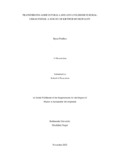
Please use this identifier to cite or link to this item:
https://hdl.handle.net/20.500.14301/350| Title: | Transforming Agricultural Land and Livelihood in Rural-Urban Fringe: A Survey of Kirtipur Municipality |
| Authors: | Pradhan, Keyur |
| Citation: | Pradhan.K.(2023).Transforming agricultural land and livelihood in rural-urban fringe: a survey of kirtipur municipality. |
| Issue Date: | Nov-2023 |
| Publisher: | Kathmandu University School of Education |
| Department: | DODE |
| Level: | Masters |
| Program: | KUMSD |
| Abstract: | Kathmandu along with its fringes has undergone rapid urbanization in recent decades due to its economic importance and availability of adequate facilities. With it, Kirtipur, Kathmandu’s fringe, has been subjected to substantial urban growth too. The migrants from rural parts of Nepal have been settling here due to low land cost, better climatic conditions, and availability of resources, gradually changing agricultural land use patterns. The purpose of the research is to understand the contextual reality of land-use change and its effect on native dwellers of Kirtipur along with perception. In this quantitative research, I applied a post-positivist approach to investigate the transforming agricultural land use pattern and the changing livelihood pattern of native dwellers of Kirtipur. I have employed the structured questionnaire with close ended questions to collect household data from wards 1,2,3,9, and 10 of Kirtipur. The study suggests that there has been a significant transformation in the socio-economic condition of native dwellers in the past three decades. Most of the native dwellers have abandoned agriculture and are engaged in business/ trade or private job or house rent suggesting that Kirtipur is gradually transforming into small industry hubs. But few people are still dependent on agriculture indicating its role as a zone of interaction between rural and urban areas. The research concludes that although the urbanization in Kathmandu urban core has been transforming Kirtipur physically, the benefits of urbanization has not been grabbed by the natives rather their traditional livelihood along with tradition, culture and values has been negatively affected. |
| URI: | https://hdl.handle.net/20.500.14301/350 |
| Appears in Collections: | Research Project |
Files in This Item:
| File | Description | Size | Format | |
|---|---|---|---|---|
| WCC_Edit final version 27November Keyur.pdf | 1.08 MB | Adobe PDF |  View/Open |
Items in DSpace are protected by copyright, with all rights reserved, unless otherwise indicated.